Social cognitive career theory assessments
Home » » Social cognitive career theory assessmentsYour Social cognitive career theory assessments images are available. Social cognitive career theory assessments are a topic that is being searched for and liked by netizens now. You can Download the Social cognitive career theory assessments files here. Get all royalty-free photos.
If you’re looking for social cognitive career theory assessments pictures information linked to the social cognitive career theory assessments topic, you have pay a visit to the ideal blog. Our site frequently gives you suggestions for viewing the maximum quality video and picture content, please kindly hunt and find more informative video articles and graphics that match your interests.
Social Cognitive Career Theory Assessments. Among the beliefs with which an individual evaluates the control over. The theory incorporates a variety of concepts eg interests abilities values environmental factors that appear in earlier career theo. Through a positive view of their own abilities and surrounding themselves with a positive network of mentors a person has a better chance of achieving their career. Lent Brown Hackett 1994 is one of the newer career theories constructed to explain and predict the ways in which individuals form career interests set goals and persist in the work environment.
 Bandura S Social Cognitive Theory Illustrated As Theoretical Pathways Download Scientific Diagram From researchgate.net
Bandura S Social Cognitive Theory Illustrated As Theoretical Pathways Download Scientific Diagram From researchgate.net
The Social Cognitive Career Theory SCCT45 provides the framework used in this research. Among the beliefs with which an individual evaluates the control over. Banduras Social Cognitive Theory The concept of self efficacy is the focal point of Albert Banduras social cognitive theory. Its original models focus on the determinants of educational and occupational interest choice and performance including persistence Lent Brown Hackett 1994. Specific to our research questions are the. The theory incorporates a variety of concepts eg interests abilities values environmental factors that appear in earlier career theo.
The theory originally included three interrelated models of a career and academic interest development b choice-making and c performance.
Social cognitive career theory SCCT was introduced 25 years ago. SCCT began as a model to explain an individuals career interest. Social cognitive career theory SCCT was introduced 25 years ago. Specific to our research questions are the. The models potential implications for career assessment and intervention are also considered. Banduras Social Cognitive Theory The concept of self efficacy is the focal point of Albert Banduras social cognitive theory.
 Source: researchgate.net
Source: researchgate.net
The models potential implications for career assessment and intervention are also considered. SCCT incorporates social cognitive theory by including an individuals self-efficacy and outcome expectations for performing a particular behavior as determinants of performing such behaviors. Social cognitive career theory SCCT. Career Decision Self-Efficacy Scale is used to measure aspects of career decision self-efficacy APPLYING SOCIAL COGNITIVE CAREER THEORY TO WOMEN Studies show occupational self-efficacy predicts interests and career choice Women scored lower on occupational self-efficacy for non-traditional occupations and higher for traditionally female occupations. There are three key components to this.
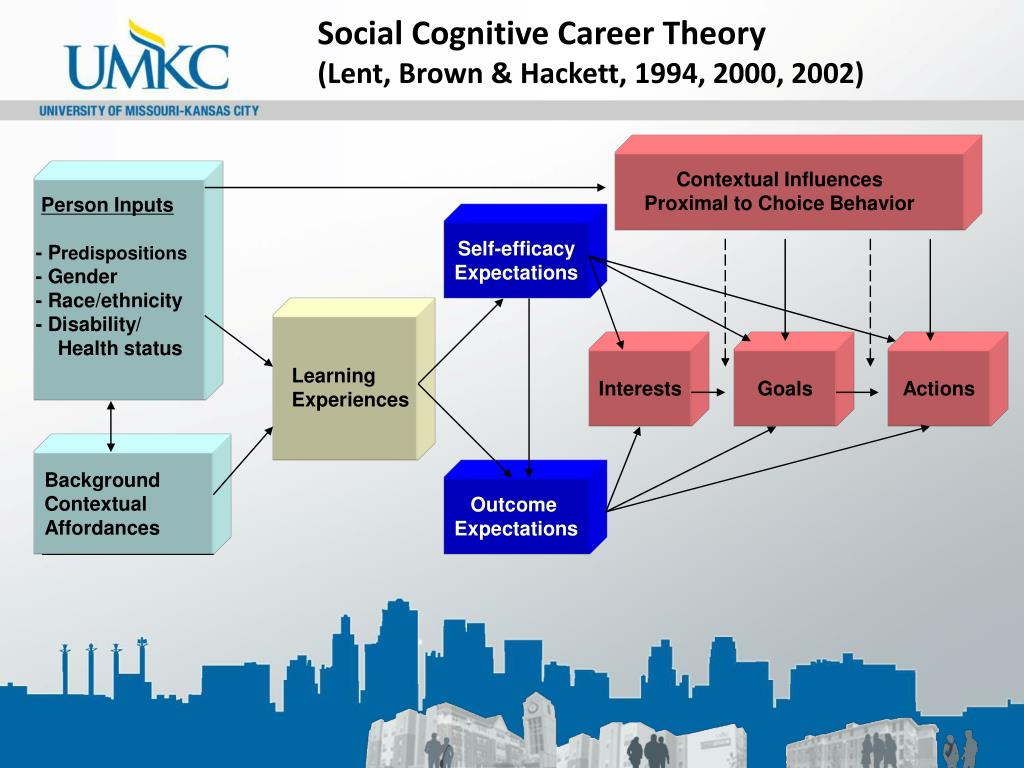 Source: exislepublishing.com
Source: exislepublishing.com
Career Decision Self-Efficacy Scale is used to measure aspects of career decision self-efficacy APPLYING SOCIAL COGNITIVE CAREER THEORY TO WOMEN Studies show occupational self-efficacy predicts interests and career choice Women scored lower on occupational self-efficacy for non-traditional occupations and higher for traditionally female occupations. Social Cognitive Career Theory or SCCT is different to but at the same time complements both Person Environment or trait and factor theories as well as developmental theories Lent 2013 pp. The theory originally included three interrelated models of a career and academic interest development b choice-making and c performance. Social cognitive career theory SCCT was introduced 25 years ago. By means of the self system individuals exercise control over their thoughts feelings and actions.

The theory incorporates a variety of concepts eg interests abilities values environmental factors that appear in earlier career theo. Social Cognitive Career Theory or SCCT is different to but at the same time complements both Person Environment or trait and factor theories as well as developmental theories Lent 2013 pp. Social cognitive career theory SCCT is a relatively new theory that is aimed at explaining three interrelated aspects of career development. The theory originally included three interrelated models of a career and academic interest development b choice-making and c performance. Drawing from social cognitive career theory SCCT a culture-specific social cognitive model of career interests and choice was tested across Hollands Investigative I and Social S themes.
 Source: marcr.net
Source: marcr.net
However SCCT is closely linked to Krumboltz Learning Theory of Career Development. Among the beliefs with which an individual evaluates the control over. SCCT began as a model to explain an individuals career interest. Drawing from social cognitive career theory SCCT a culture-specific social cognitive model of career interests and choice was tested across Hollands Investigative I and Social S themes. Lent Brown Hackett 1994.
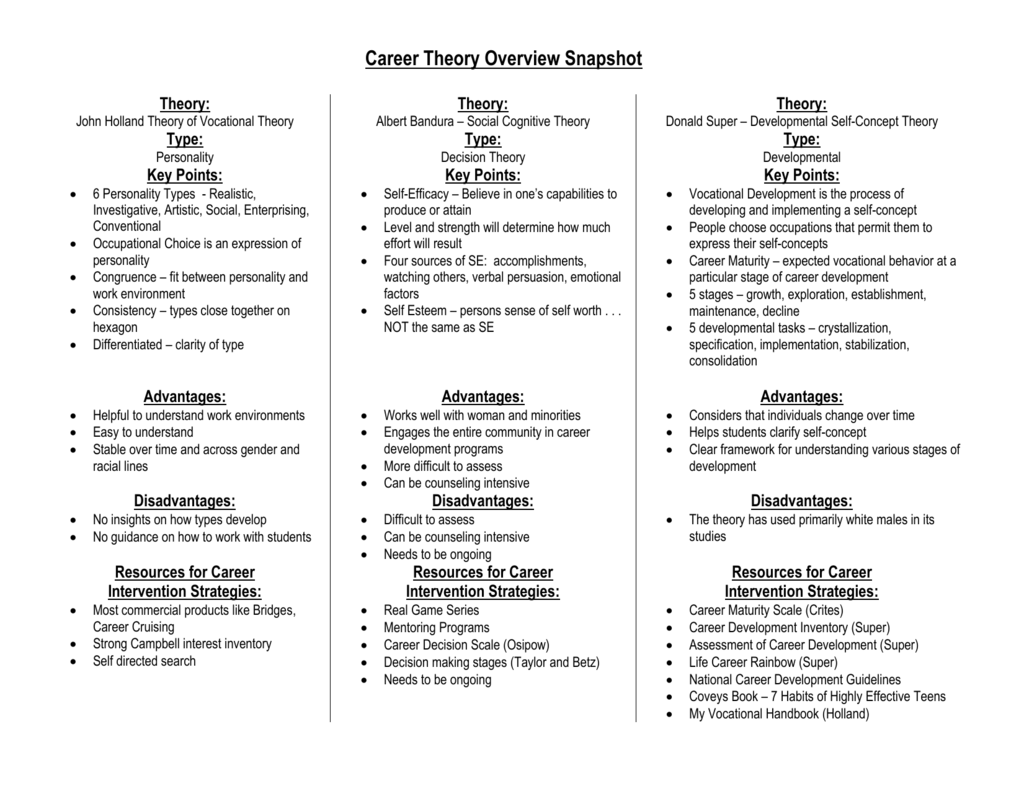 Source: studylib.net
Source: studylib.net
Its original models focus on the determinants of educational and occupational interest choice and performance including persistence Lent Brown Hackett 1994. Drawing from social cognitive career theory SCCT a culture-specific social cognitive model of career interests and choice was tested across Hollands Investigative I and Social S themes. Social Cognitive Career Theory was first described by Lent Brown and Hackett in 1996. Specific to our research questions are the. It was later expanded to include two additional models one focusing on educational and occupational satisfaction or.
 Source: researchgate.net
Source: researchgate.net
Specific to our research questions are the. Lent Brown Hackett 1994 is one of the newer career theories constructed to explain and predict the ways in which individuals form career interests set goals and persist in the work environment. Drawing from social cognitive career theory SCCT a culture-specific social cognitive model of career interests and choice was tested across Hollands Investigative I and Social S themes. Banduras Social Cognitive Theory The concept of self efficacy is the focal point of Albert Banduras social cognitive theory. Vocational hope was proposed as a mechanism through which at-risk youth could develop a positive future orientation an essential component of the career development process Brown Lamp Telander Hacker 2012.
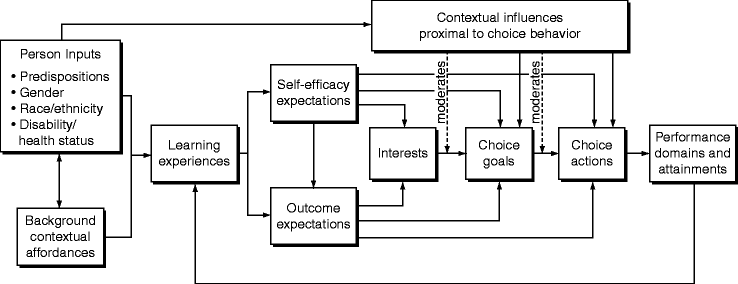 Source: link.springer.com
Source: link.springer.com
Vocational hope was proposed as a mechanism through which at-risk youth could develop a positive future orientation an essential component of the career development process Brown Lamp Telander Hacker 2012. There are three key components to this. Specific to our research questions are the. They then describe a newly developed social cognitive model that is designed to capture the interplay among multiple eg affective cognitive behavioral social sources of job satisfaction. The theory blends some aspects of social learning theory and cognitive theories.
 Source: marcr.net
Source: marcr.net
By means of the self system individuals exercise control over their thoughts feelings and actions. Social Cognitive Career Theory or SCCT is different to but at the same time complements both Person Environment or trait and factor theories as well as developmental theories Lent 2013 pp. Specific to our research questions are the. Measures assessing vocational hope. They then describe a newly developed social cognitive model that is designed to capture the interplay among multiple eg affective cognitive behavioral social sources of job satisfaction.
 Source: sciencedirect.com
Source: sciencedirect.com
It was later expanded to include two additional models one focusing on educational and occupational satisfaction or. There are three key components to this. Lent and Brown6 demonstrated the SCCT model and provided information for developing an instrument to measure components of the SCCT model. Social cognitive career theory SCCT is a relatively new theory that is aimed at explaining three interrelated aspects of career development. Social Cognitive Career Theory was first described by Lent Brown and Hackett in 1996.

A large diverse sample of undergraduate Asian American students N 802 from a Mid-Atlantic university participated in the study. A large diverse sample of undergraduate Asian American students N 802 from a Mid-Atlantic university participated in the study. In career development Social Cognitive Theory helps to explain how a person can set up their career development plan for success. Lent Brown Hackett 1994. Vocational hope was proposed as a mechanism through which at-risk youth could develop a positive future orientation an essential component of the career development process Brown Lamp Telander Hacker 2012.
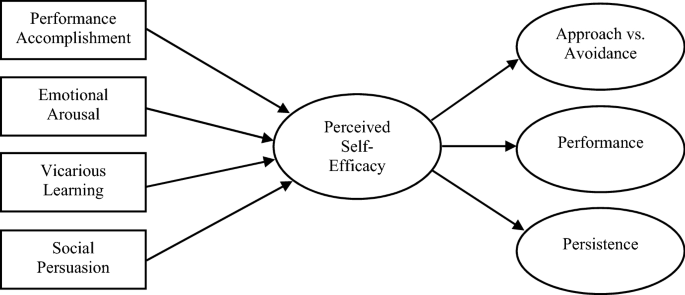 Source: link.springer.com
Source: link.springer.com
There are three key components to this. Social Cognitive Career Theory or SCCT is different to but at the same time complements both Person Environment or trait and factor theories as well as developmental theories Lent 2013 pp. The models potential implications for career assessment and intervention are also considered. Social cognitive career theory SCCT. As with many career theories however much of the extant research tends.
 Source: sciencedirect.com
Source: sciencedirect.com
Lent and Brown6 demonstrated the SCCT model and provided information for developing an instrument to measure components of the SCCT model. Vocational hope was proposed as a mechanism through which at-risk youth could develop a positive future orientation an essential component of the career development process Brown Lamp Telander Hacker 2012. SCCT began as a model to explain an individuals career interest. It was later expanded to include two additional models one focusing on educational and occupational satisfaction or. There are three key components to this.
 Source: marcr.net
Source: marcr.net
Vocational hope was proposed as a mechanism through which at-risk youth could develop a positive future orientation an essential component of the career development process Brown Lamp Telander Hacker 2012. The theory originally included three interrelated models of a career and academic interest development b choice-making and c performance. Lent Brown Hackett 1994 is one of the newer career theories constructed to explain and predict the ways in which individuals form career interests set goals and persist in the work environment. Aspect of human behavior. Its original models focus on the determinants of educational and occupational interest choice and performance including persistence Lent Brown Hackett 1994.
 Source: marcr.net
Source: marcr.net
Social Cognitive Career Theory was first described by Lent Brown and Hackett in 1996. As with many career theories however much of the extant research tends. Through a positive view of their own abilities and surrounding themselves with a positive network of mentors a person has a better chance of achieving their career. Career Decision Self-Efficacy Scale is used to measure aspects of career decision self-efficacy APPLYING SOCIAL COGNITIVE CAREER THEORY TO WOMEN Studies show occupational self-efficacy predicts interests and career choice Women scored lower on occupational self-efficacy for non-traditional occupations and higher for traditionally female occupations. Social cognitive career theory SCCT.
 Source: researchgate.net
Source: researchgate.net
A large diverse sample of undergraduate Asian American students N 802 from a Mid-Atlantic university participated in the study. Social cognitive career theory SCCT is a relatively new theory that is aimed at explaining three interrelated aspects of career development. SCCT began as a model to explain an individuals career interest. The theory incorporates a variety of concepts eg interests abilities values environmental factors that appear in earlier career theo. Social Cognitive Career Theory was first described by Lent Brown and Hackett in 1996.
 Source: researchgate.net
Source: researchgate.net
The Social Cognitive Career Theory SCCT45 provides the framework used in this research. Lent Brown Hackett 1994. Measures assessing vocational hope. They then describe a newly developed social cognitive model that is designed to capture the interplay among multiple eg affective cognitive behavioral social sources of job satisfaction. Social Cognitive Career Theory.
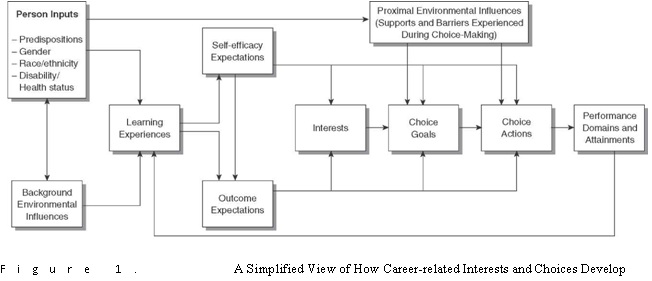 Source: career.iresearchnet.com
Source: career.iresearchnet.com
The theory blends some aspects of social learning theory and cognitive theories. Social cognitive career theory SCCT consists of five interrelated models. Social cognitive career theory SCCT was introduced 25 years ago. Vocational hope was proposed as a mechanism through which at-risk youth could develop a positive future orientation an essential component of the career development process Brown Lamp Telander Hacker 2012. SCCT began as a model to explain an individuals career interest.
 Source: psychology.iresearchnet.com
Source: psychology.iresearchnet.com
Banduras Social Cognitive Theory The concept of self efficacy is the focal point of Albert Banduras social cognitive theory. Social Cognitive Career Theory was first described by Lent Brown and Hackett in 1996. SCCT began as a model to explain an individuals career interest. Lent and Brown6 demonstrated the SCCT model and provided information for developing an instrument to measure components of the SCCT model. In career development Social Cognitive Theory helps to explain how a person can set up their career development plan for success.
This site is an open community for users to do submittion their favorite wallpapers on the internet, all images or pictures in this website are for personal wallpaper use only, it is stricly prohibited to use this wallpaper for commercial purposes, if you are the author and find this image is shared without your permission, please kindly raise a DMCA report to Us.
If you find this site beneficial, please support us by sharing this posts to your preference social media accounts like Facebook, Instagram and so on or you can also save this blog page with the title social cognitive career theory assessments by using Ctrl + D for devices a laptop with a Windows operating system or Command + D for laptops with an Apple operating system. If you use a smartphone, you can also use the drawer menu of the browser you are using. Whether it’s a Windows, Mac, iOS or Android operating system, you will still be able to bookmark this website.